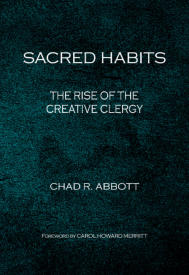In addition to my experience of Carol Howard Merritt’s new book, Healing Spiritual Wounds, as part of a larger conversation on Church & faith in the 21st century, recently new to the same conversation is a collection of essays entitled Sacred Habits: The Rise of the Creative Clergy.
 Edited by my colleague Chad Abbott, Sacred Habits (Noesis Press 2016) features personal, professional & practical reflections on the roles of clergy in the 21st century. The essays are written by ministers who serve in local churches, academia, institutions, and entrepreneurial ventures. My own chapter in Sacred Habits is “Disrupting Sabbath.”
Edited by my colleague Chad Abbott, Sacred Habits (Noesis Press 2016) features personal, professional & practical reflections on the roles of clergy in the 21st century. The essays are written by ministers who serve in local churches, academia, institutions, and entrepreneurial ventures. My own chapter in Sacred Habits is “Disrupting Sabbath.”
If the book’s subtitle — The Rise of the Creative Clergy — implies new revelations in the rise of its essayists’ practices and perspectives, I might temper such a hint to emphasize that Sacred Habits represents creativity more than discovery, not so much a new wheel but a new set of voices. In seasons of change & upheaval such as the 21st century Church is experiencing, it can be tempting to claim newness in all things, to perceive the changing climate as completely unique (it’s not: change is ongoing), and to see ourselves as uniquely positioned to save it (we’re not: theologically & practically speaking, ours is not the task of saving but of faithfully engaging).
It’s possible that I’ve stepped on the “Let’s save the Church!” soapbox a time or two, which is why I offer caution.
Sacred Habits is a useful book for clergy who seek to engage faithfully, not to save but to participate in change with intentionality and authenticity. The book is rich food-for-thought for ministers, ministry settings, and those training for ministry. It could serve to support a brainstorming session between a pastor and the leaders in her congregation. It could prompt a monthly series of ministerium conversations. It could encourage a minister whose theology for ministry has become disconnected from his practice of ministry.
Reading Sacred Habits as a colleague in this ongoing conversation about ministry in a changing Church and faith in the 21st century, I tumble with questions for my fellow essayists:
Are we aware of how many dead white men we quote and cite as central to our theological compasses? And, if we’re aware of it, how are we responding to it?
Have we adequately discerned our own critiques of Church from the wider world’s critiques of Church? Maybe that’s an unrealistic or unnecessary distinction, but in our essays I hear the occasional conflation of ideas that suggest (to me) that we have borrowed others’ critiques without much reflection: systematic theology, for example, is not synonymous with doctrine; the latter tends to get a bad rap (understandably) but the former means a way of thinking about faith — which I hope we’re doing! Also in the category of words not currently in vogue is “institution,” which the book’s chapters occasionally lament even though each clergy essayist serves as a representative of the Church as institution.
(There are more questions to be asked. The book’s provocation to conversation is one of its assets, and I would buy the first round of drinks for the above and additional conversations.)
Questions noted, I am proud to be a contributor to Sacred Habits and I am impressed by my colleagues who are so thoughtful, resilient and faithful in their ministries. I commend Sacred Habits to readers who seek a nudge of inspiration for their ministries, who are looking for a tool by which to reflect on their ministry calls & contexts, who might be encouraged by a vision of creative ministries and by a community of conversationalists who are earnestly & faithfully engaging change in the 21st century Church.
